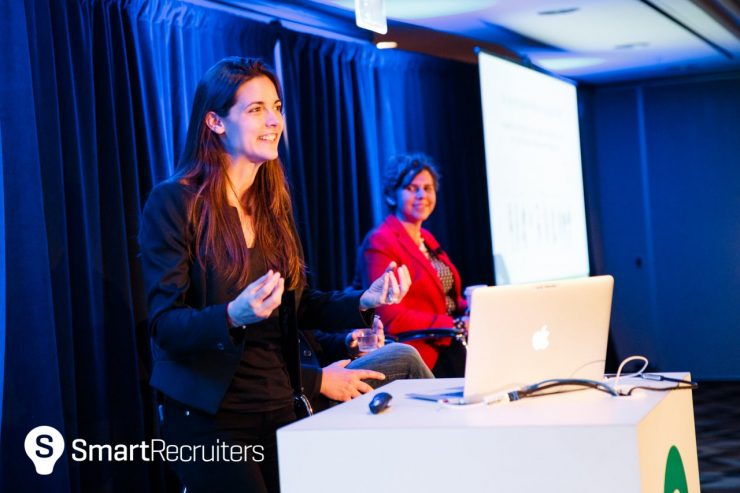When a young business analyst decided management consulting wasn’t her calling, she found it difficult to find career advice that spoke to her as a millennial job-seeker.
Given the average adult in the US changes jobs around 12 times between the ages 18-48, with the majority of those transitions happening in the first six years of their career – it seemed strange that no one had created a platform to locate expert career advice, surface unexpected opportunities, and guide young people to success.
In 2011, former business analyst Kathryn Minshew became a founder and CEO when she made her dream resource a reality with The Muse website, a non-traditional job board focused on fit, culture and career advice for job seekers.
And 50 million millennial professionals visiting the site to date says ‘job well done!’
Kathryn has become something of a career guru for millennials, authoring the Wall Street Journal bestseller “The New Rules of Work,” and acting as an operating partner at XFactor Ventures, a venture capital fund investing in the next generation of female founders.
Kathryn recently spoke at the Hiring Success Conference in San Francisco about the effect of candidate experience on employer brand in an era of full transparency.
What does the concept of Hiring Success mean to you?
Hiring Success is about creating meaningful fits between companies and candidates. At The Muse, we think more about experiences than jobs because jobs can box people in, whereas experiences set people on a path for learning and growth. But, in order to build a satisfying career—or a progression of experiences over time—both companies and candidates have to be more aware of making considerate and purposeful choices. When that happens, a meaningful fit is made, which leads to quality hires and better retention.
Where on a CEO’s list of priorities should ‘recruitment’ be?
I’ve always felt that recruitment should be a top priority because it’s so intrinsic to company culture. You have to know who you are as a whole so you can hire people who will add value and keep your culture strong as you grow.
We hired The Muse’s first internal talent acquisition manager when we had just 25 people because we knew were going to grow pretty quickly and we wanted to make sure our culture never faltered. Bringing the right people on board is imperative when it comes to reaching your growth goals, and recruiters can help you attract and engage the best-fit talent.
What do you think will be the defining feature of recruitment in five years?
Work is about connections and it’s full of commitments. The best companies understand this and create a work experience that’s centered around some of the most fundamental relationship dynamics (values, trust, vision, effort, and selflessness). Ideally, recruiting in five years will no longer be transactional, with applicants applying through a job board and hiring managers sifting through stacks of resumes. Hopefully, companies and candidates will feel empowered to make intentional decisions about what makes a meaningful fit.
You have traveled the world extensively. Did you gain any insights which have played into your approach to employer branding and recruitment?
I’ve traveled or lived in over 60 countries in the last 15 years, and I’ll say this about both travel and employment: they’re highly subjective. Whether something is a one-star or five-star experience depends on whether your expectations and needs match with reality: what were you looking for, and did you receive it?
Travel rating sites work because we can assess the type of environment we’re seeking, and then we can rate a property or experience based on those expectations and parameters. It’s unbelievable to me that we have no common language to talk about types of company cultures. I’d like The Muse to change that.
You speak often about millennials and job branding. What do you find millennials want to see?
Authenticity. Millennials want to see that your employees’ experiences are in sync with the message your employer brand is putting out there. So if you say you support learning and development, or value work-life balance, they want to see those statements reflected in company reviews or validated by employee testimonials. They want to know that what they see is the real thing.
How can companies better appeal to millennial candidates?
Millennials want to feel like their career has real purpose, so when they look at potential employers, they’re looking for a place where the mission and values match their own, or where the learning opportunities are substantial.
For companies, this means using your employer brand to authentically show candidates what you’re committed to as an organization. It’s also an opportunity to encourage employee advocacy by asking your workforce to share their stories—even if it’s something as small as posting about an exciting work event on social media.
In terms of company culture, what are the most common mistakes companies make?
Trying to be everything to everyone. When companies aren’t being authentic, it creates a ripple effect in the culture, so this really goes back to hiring, because every new person who joins your team has the power to change your culture.
It’s OK if your company and culture aren’t for everyone. Know your audience and appeal to those best-fit candidates.






